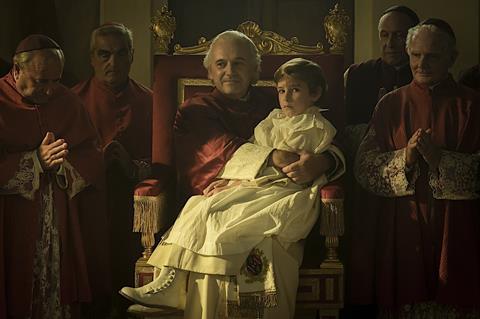Italian veteran Marco Bellocchio’s Competition drama tells the true story of how the Vatican kidnapped a young Jewish boy

Dir: Marco Bellocchio. 2023. Italy, France, Germany. 125mins
Religious and political fanaticism, the abuse of power, emotional manipulation and blackmail: these subjects have always fascinated veteran Italian director Marco Bellocchio. His most passionate films centre on lives taken, warped or ruined in the service of a cause, and Kidnapped is no exception. A sinewy period piece, it uses the true story of a young Jewish boy who was almost literally ‘kidnapped’ by the Vatican in the mid 19th century as a study in what happens when fragile human values come up against an autocratic system underpinned by immovable dogma.
Hides a bleak and bracing message inside lovely old costumes and sumptuous set pieces
With its enjoyably over-the-top orchestral soundtrack, pin-sharp casting and old-school period-film production values, Kidnapped initially feels like a fairly conventional take on a remarkable historic cause celebre – one that Steven Spielberg tried and failed to bring to the screen a few years back. But once we enter the Vatican and meet the needy, imperious pope played with malevolent glee by Paolo Pierobon (a gifted theatrical actor still underused in the cinema) the film shifts gear.
Melodrama curdles and turns acid, as a serpentine script (co-written with fellow director Susanna Nicchiarelli) takes our naive wish to see justice done, to see a shocking anti-Semitic wrong righted, and hangs it out to dry. Kidnapped hides a bleak and bracing message inside lovely old costumes and sumptuous set pieces and this double nature will serve the film well both at home in Italy and abroad, where it should continue the late-career international visibility Bellocchio achieved with Vincere (2009) and The Traitor (2019).
As true stories go, it’s jaw-dropping. In 1858, a six-year-old Jewish boy called Edgardo Mortara was forcibly removed from his family in Bologna and spirited away to Rome to be educated and raised as a Catholic under the tutelage of the Pope. The reason? Years before, a Christian servant employed by the child’s family had secretly baptised the boy – which made him automatically Catholic. And Catholics could not, according to the Church doctrine of the time, be raised by those of a different faith. The ensuing scandal brought global condemnation of the Vatican and Pope Pius IX – who nevertheless refused to back down. There is a theory, toyed with in the film, that the Mortara case even hastened the case for Italian unification and the call to establish Rome as the capital of a secular state.
Basing the script loosely on a book about the case by Italian journalist Daniele Scalise, Bellocchio and Nicchiarelli make the first act all about the disbelief, then the desperation, of a Bolognese family who see one of their eight children snatched away by the gendarmes of a city that was then part of the Papal States. Kidnapped reveals how arbitrary exercises of power spread like a virus.
Edgardo’s anxious father (Fasuto Russo Alesi) tries to settle things between men, reasoning with the Catholic authorities, working with the local Jewish community to mobilise friends, supporters and newspaper coverage. His sidelined wife Marianna (Barbara Ronchi), however, is a mother on the warpath with no appetite for compromise. Against her blind fury is set the ‘reasonableness’ of the Roman Jewish leaders, who tell the father to leave the case with them as they know how to handle the Pope. Handling the Pope, though, turns out to mean being utterly humiliated and still getting nowhere.
Spielberg apparently abandoned his own Mortara project because he couldn’t find the right child to play Edgardo. Bellocchio perhaps had an easier task as, although young Enea Sala is perfectly convincing, the young innocent he plays is deliberately made something of a cipher, the blank space in the eye of the storm. His enigmatic role is taken over by Leonardo Maltese as the adolescent Edgardo in the film’s second half, and it’s here that the empty space starts to become filled in with cruel irony.
But there’s also a dark vein of deadpan comedy in a film in which we see, at one point, a slightly dazed Christ descend from the cross and pad through the opulent halls of the Vatican, or an animated cartoon pope being chased by rabbis who want to circumcise him. Bellocchio knows how to dose these extravagant moments, weaving them into the story but also forcing his audience to reflect on just how violent and cruel the image of the crucifixion must seem to a child brought up in a different faith – or how clichés and lies surrounding Judaism and Jewish ‘conspiracies’ did not end with the death of a 19th century pope.
Production companies: IBC Movie, Kavac, Rai Cinema
International sales: The Match Factory, info@matchfactory.de
Producers: Beppe Caschetto, Simone Gattoni, Paulo del Brocco
Screenplay: Marco Bellocchio, Susanna Nicchiarelli, from the book ‘Il caso Mortara’ by Daniele Scalise
Production design: Andrea Castorina
Editing: Francesca Calvelli, Stefano Mariotti
Cinematography: Francesco di Giacomo
Music: Fabio Massimo Capogrosso
Cast: Paolo Pierobon, Fausto Russo Alesi, Enea Sala, Leonardo Maltese, Barbara Ronchi, Filippo Timi, Fabrizio Gifuni, Andrea Gherpelli, Samuele Teneggi, Corrado Invernizzi, Paolo Calabresi























